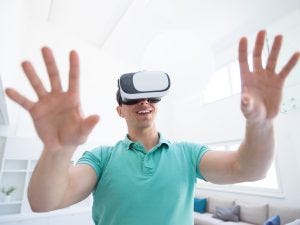Content Spotlight
Podcast: MilliporeSigma says education vital to creating unbreakable chain for sustainability
MilliporeSigma discusses the importance of people, education, and the benefits of embracing discomfort to bolster sustainability efforts.

CGT Catapult has started to include virtual reality (VR) training across the entirety of its skills development programs to meet demands of the industry.
Workforce development opportunities are a focal point in the pharma space as there is a general consensus among professionals that the amount of talent coming through the ranks does not match the huge investment in capacity being seen across the life sciences industry.
With many roles requiring highly skilled workers, training programs are being altered and updated to meet the demands of the industry. The UK’s Cell and Gene Therapy Catapult (CGT Catapult) is offering VR training through its Advanced Therapies Apprenticeship Community (ATAC) initiative.

Image: Stock Photo Secrets
VR is a computer-generated realistic environment that is usually perceived through a headset or a helmet, which immerses the user to feel like they are operating in the surroundings they can see.
“ATAC initiative […] is designed to deliver world-class training and education to individuals that are joining the sector or upskilling within the sector through apprenticeships,” Matthew Durdy CEO at CGT Catapult told us.
“This initiative was setup to meet the growing demands of advanced therapy manufacture and development. VR training is also offered through the National Training Centres, part of the Advanced Therapies Skills Training Network (ATSTN), and through the state-of-the-art skills development capabilities that are being developed in Stevenage [about 40m north of London].”
The organization was keen to outline that VR training is in no way a replacement “for physical hands-on training, but rather an introduction to it, which prepares the trainee, reducing the time required on the real kit [and] in the GMP suite.”
According to Durdy, the immersive experience preps the trainee for the environment they will operate in and removes the risk of compromising a physical cleanroom while completing training.
“The individual is taken through training on procedures and behaviours which are required in a GMP environment which can range from gowning to enter a cleanroom, production room cleaning procedures and health and safety training,” said Durdy.
The training programs have been developed in partnership with FourPlus and are based on CGT Catapult’s large-scale manufacturing site in Stevenage, UK. Additionally, the training will work with AAV tech transfer in London.
“The art of what is possible in mixed reality training has been developed in partnership with AMRC/Sheffield University using cutting edge virtual reality glove technology for remote training and troubleshooting as well as augmented reality tools, placing operational instructions through a headset on to processing equipment whilst in use,” Durdy said.
The training modules are all different and range between 15 to 45 minutes. The training includes around 5 to 10 minutes of virtual instruction, which is followed by a marked independent assessment.
CGT Catapult is in the first phase of rolling this training program out (mainly due to COVID-19 restrictions). The organization has received feedback from just short of 20 apprentices so far, all of which they say has been “very positive.”
As already stated, VR training does not replace physical training. However, Durdy said the apprentices that have completed this training “say it definitely reduces their anxiety about going in first time and messing it up […] In addition, this training also gives people who will never do it in an idea of what GMP is and gives them an appreciation for its requirements.”
Not only does VR training minimize anxiety of making a mistake in a physical setting, Durdy said it also reduces “cost associated with production downtime,” due to an increase in confidence of operators and competence.
“VR training has significant cost, efficiency and safety benefits in a virtual GMP environment compared to traditional training in a physical setting, but it will never replace the final training which takes place on site,” said Durdy.
He continued: “In a standard on-site training environment, costs quickly add up from consumables needed, specialist training resources, administration time, whereas with VR training, once the headset and the space are made available, there are no additional costs except of course that of the time of the assessor.”
You May Also Like